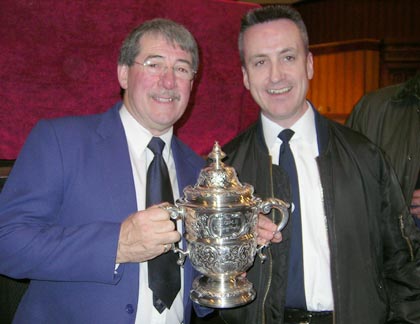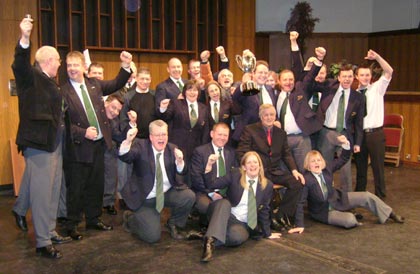2006 Midlands Regional Championships - Championship Section retrospective
16-Mar-2006There was bound to be one result no one saw coming in the Regionals this year, but was it really Newstead's win at Burton on Trent.
It seems like a long time since the Midlands Area Championship was virtually the exclusive domain of Desford Colliery and William Davis Construction Group, but through much of the 1980's and early 1990's it was true to say few other bands got a serious look in. Since then the Midlands has remained one of the most open fields of any of our area contests and a quick glance at this year's runners and riders soon reveals why this has been the case.

Newstead celebrate with a replica of the rugby world cup!
In Desford, GUS, Ransome, Staffordshire and Woolley Pritchard Sovereign there were five bands, pretty much half of the field, who on paper at least were clearly capable of lifting the crown and who have previously experienced the glories of the Royal Albert Hall. Add to that the likes of Jaguar (Coventry), Thoresby Colliery and Newstead, all of whom have challenged closely in the past and you know that all the ingredients are there for a fascinating and closely fought contest.
And fascinating it certainly was on a snowy Sunday afternoon in Burton on Trent when Malcolm Brownbill and David Horsfield sat down to preside over eleven performances of Peter Graham's still shiny and new ‘Journey to the Centre of the Earth'. By modern standards it's a piece that might not impose the greatest technical demands on the bands but that all depends on how you define technique.
In point of fact all of the competing bands coped reasonably well with the faster sections of the work but as so often happens it was the slow music that tested the true technique (not to mention nerve) of the players and ultimately opened up the cracks in the earth's crust that were to separate the front runners from the also rans. The contest was barely a quarter of the way through before it became pretty obvious that the importance of the contributions from the various soloists was going to be as critical in the final analysis as any other aspect of the performance.
It fell to Langley to take to the stage in the number one spot and turn in a creditable performance that on a different day could have seen them higher up the field than their tenth position ultimately merited.
A good start was somewhat marred by wayward percussion in the Descent and although the band got themselves back on track pretty quickly the atmosphere captured at the beginning of The Summit of Snaefells wasn't entirely matched in The Wonders of the Terrestrial Depths. Of the three soloists in The Day of Rest it was the soprano that shone and although the Battle of the Antediluvian Creatures could have done with a little more ferocity the closing bars concluded the performance on a positive note.
As in the Second Section earlier in the day, the band that took to the stage second were to earn themselves a corresponding second prize and deservedly so. Jaguar's third place in last year's contest had somewhat divided opinion but there were no such doubts over their performance this year.
There are two factors that consistently mark out Dave Lea's efforts on the contest stage, namely fastidious preparation combined with ever present musicality and both were evident in abundance in his band's performance.
In many ways Jaguar gave the most rounded performance of the day, marked by a solid but never over blown sound, soloists who simply did not put a foot wrong (no doubt particularly gratifying for the conductor in that his two sons were prominent on solo trombone and soprano) and a skilfully handled sense of tension and atmosphere that captured the imagination in a way that Jules Verne would have been proud of. 
London here we come! - Jaguar celebrate their trip to London
It may have lost just a bit of steam towards the end but it was a performance that could so easily have squeezed into first place.
The Staffordshire Band under Nigel Boddice could certainly have been a pre-contest choice as one of the bands with a realistic chance of snatching the title, but from the opening bars they never really succeeded in getting inside the atmosphere of the music.
The initial excitement generated in the Descent was offset by inconsistency of tempo whilst the soloists in The Day of Rest ranged from a heavy handed solo cornet to a somewhat tentative soprano. In fact it was playing of a tentative nature that marked many of the quieter passages and ultimately the performance as a whole was simply not consistent enough to make a serious mark.
Desford's contest performances in recent years have largely been entrusted to Peter Parkes, who on this occasion had been retained by Woolley Pritchard Sovereign with Desford turning to their developing relationship with Nigel Seaman.
Although the trombones did not quite manage to get the opening chord together the early bars unfolded well to reveal an authoritative Descent that whilst occasionally tending to the aggressive lacked nothing in terms of sheer excitement. The basses sang well in the Terrestrial Depths with excellent contributions from trombone and Ben Godfrey on solo cornet in The Day of Rest. From here confidence was clearly riding high and sonorous sounds allied with real momentum in the Rescue from the Abyss combined to conclude a fine performance in powerful style.
Desford's sixth position was sure to have left a few people, not least the band themselves, scratching their heads (we had them leading the field through to the end) but it was not to be their day and no doubt Nigel Seaman was left questioning what more he could have done to have brought about a result.
GUS too were to face a disappointing fifth place off their number five draw, but in their case it was inconsistency that was to be their undoing. A fine opening and exciting Descent got things off to a promising start but the basses failed to gel in the Terrestrial Depths and a lovely solo trombone in The Day of Rest was marred by a lumpy start to the section from the horns and baritones.
Atmosphere was lacking in The Whispering Gallery and whilst it was a fine bass trombone that got things going into The Rescue, The Battle lacked a real feroce in its Rite of Spring like power.
Mike Fowles could have been torn down the middle as he was shown to be conducting Ratby in the Midlands and BT in the North West at the same time. Fortunately for him Ratby took mercy and enlisted former local boy Martin Winter to direct instead.
The overall impression of Ratby's performance was one of volume at the expense of subtlety. That said, whilst the opening did not capture the atmosphere as well as many, The Whispering Gallery was one of the more successful attempts of the day. Detail was often lacking in the faster music however and there was a nagging feeling that things were not quite welding as they should.
For sheer band sound Woolley Pritchard Sovereign were up there with the best of the day but as with so many of the performances it was to be The Day of Rest and Lost in the Labyrinth that didn't quite come off. Peter Parkes was one of the truest conductors to the score in terms of his tempos and as a result the performance had a well measured feel about it. Yet the ensemble suffered through hesitancy in The Day of Rest and although David Maplestone's cornet solo made up for a tentative trombone, The Whispering Gallery had an oddly ordered feel about it as the players were directed in their Latin whispering from the principal cornet chair: surely not what the composer intended. We shared the adjudicator's opinion that fourth place was about right.
Thoresby were always one of the potential dark horses of the day and Martin Heartfield got them off to a convincing start in The Summit and Descent. Things went slightly awry in the Terrestrial Depths when the basses seemed to unsettle things momentarily but a recovery into The Day of Rest and Lost in the Labyrinth allowed for reasonable solos from all concerned even if dynamic markings were not always strictly observed.
All credit to the bass trombone for an excellent start into the Rescue and the Homecoming was well executed if not the most exciting conclusion of the day. Third place will be seen by many as a generous reward but Thoresby certainly gave one of the more solid performances of the day.
There is no escaping the fact that despite an incredibly open field it would have been a brave soul that would have cited Newstead Welfare as the potential winner. Duncan Beckley, for all his wealth of experience, must have been equally stunned by the result although make no mistake, Newstead's performance was clearly well prepared and had moments where glimpses of quality shone through. The problem was simply the fact that the band did not succeed in sustaining that quality through the entire performance.
The initially slow tempo seemed to hinder the early atmosphere settling although The Descent worked well with the band generating real momentum. The terrestrial basses were finely balanced but once again here there was a nagging feeling that the atmosphere was not entirely settled. The soloists in The Day of Rest got by although certainly didn't shine as the best of the day (that honour still fell to Jaguar) with an incisive bass trombone getting The Rescue off to a rhythmically tight and exciting start, followed by a ferocious, if at times harsh Battle of the Antidiluvian Creatures.
The fact that Newstead carried off the title, despite a performance that had its moments, can only be described as the strangest adjudicating decision of the Midland weekend. Had the positions of Newstead and Desford been reversed we reckon that the overall placings would have been about right. As it is, the fact remains that whatever it was that the adjudicator's heard in Newstead's performance to place it ahead of the field remains with them and them only.
Ransome's must have fancied their chances from a number ten draw and for a while all went promisingly well. The collapse of the two solo basses in the Terrestrial Depths however seemed to herald a general collapse in the band's confidence and with the exception of a well played, if overly milked trombone solo from Chris Jeans the performance never seemed to recover. Ninth place would have been a great disappointment to the players but was pretty accurate in the final analysis.
Jackfield Elcock Reisen, under the direction of John Maines, had the unenviable task of taking to the stage last and from the start it sounded like the long wait had already tired them out. Insecure soloists coupled with a lack of atmosphere and momentum ensured that their corresponding eleventh placing in the results was never really in doubt.
On a day when it would have taken a brave man to bet his horn on the outcome, Malcolm Brownbill and David Horsfield seemed to have the general measure of things bar one crucial matter, namely the winner. There is no doubt that Newstead's players gave their all under Duncan Beckley's intelligent direction but ultimately the performance was never the sum of its parts. As such the glorious unpredictability that is the Midlands Area Championship Section still lives on in all its glory and will no doubt continue to do so come 2007.
Christopher Thomas.















